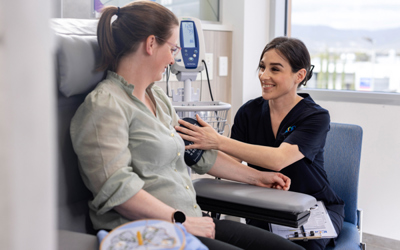What are the treatment options for lymphoma?
The primary treatment options for lymphoma include chemotherapy, radiotherapy, bone marrow transplants (sometimes referred to as stem cell transplants), targeted therapies and monoclonal antibodies (immunotherapy). The type of treatment you receive will depend on a number of different considerations, such as the sub-type of lymphoma you have, its stage, your overall health and your treatment preferences. This page aims to give you a comprehensive overview of how lymphoma treatment works.
Chemotherapy for lymphoma
Chemotherapy uses a range of drugs to both kill and slow the growth of lymphoma cells. Typically, chemotherapy is the primary treatment for aggressive or advanced forms of lymphoma. In certain circumstances, chemotherapy drugs may be used in combination with other treatment methods such as antibody therapy, steroid therapy or radiotherapy.
Common chemotherapy medicines
There are a number of different chemotherapy drugs that are used to treat lymphoma. These drugs are typically combined based on the type of lymphoma you have, your cancer’s stage and how much it has spread. Some of the drugs used include:
-
Bendamustine and cyclophosphamide
These belong to a class of chemotherapy drugs called alkylating agents. They work by damaging the DNA of cells so they are unable to divide, causing them to stop growing and die. They are typically given by intravenous infusion, with each infusion usually given over 30 to 60 minutes.
-
Bleomycin
This drug works by interfering with the process of cell division which destroys rapidly dividing cells such as lymphoma cells. It is administered by intravenous infusion over a period of 10 minutes.
-
Doxorubicin
This chemotherapy drug destroys cancer cells or stops their growth by interfering with the way that DNA is made within cells. It is given by intravenous infusion and is bright red in colour, with each infusion taking between five and 15 minutes.
-
Cisplatin
This type of chemotherapy drug is a platinum compound that works by binding to and damaging DNA within cancer cells, preventing them from being able to divide and grow. It is typically given via a continuous intravenous infusion pump over 24 hours.
-
Gemcitabine
This is classified as an antimetabolite chemotherapy drug. It works by interfering with the DNA of cancer cells to stop them from being able to divide and grow. It is given by intravenous infusion.
-
Vincristine
This drug works by interfering with the process of cell division, which prevents them from being able to divide and grow. It is given by intravenous infusion over five to 10 minutes.
These drugs are often given in different combinations depending on the type of lymphoma you have. Rituximab and Obinutuzumab (Gazyva) are monoclonal antibodies and are often combined with chemotherapy in a treatment referred to as immunochemotherapy.
Examples of common chemotherapy regimens
Non-Hodgkin lymphoma
Bendamustine-Rituximab (BR)
Bendamustine-Gazyva (BG)
Cyclophosphamide-Doxorubicin-Prednisolone-Rituximab-Vincristine (R-CHOP)
Cyclophosphamide-Prednisolone-Rituximab-Vincristine (R-CVP)
Rituximab (R)
Hodgkin lymphoma
Bleomycin-Dacarbazine-Doxorubicin-Vinblastine (ABVD)
Bleomycin–Etoposide–Doxorubicin-Cyclophosphamide-Vincristine–Procarbazine-Prednisolone (BEACOPP Escalated)
Radiotherapy for lymphoma
Patients who receive radiotherapy for lymphoma will commonly receive external beam radiotherapy (EBRT).
Radiotherapy may be used to treat early-stage lymphomas (stage I or II). Radiotherapy and chemotherapy may be used together in a treatment often referred to as chemo-radiation.
Targeted therapy for lymphoma
Targeted therapies use specialised drugs to destroy specific proteins in lymphoma cells, while aiming leaving healthy cells intact. These drugs aim to stop lymphoma cells from repairing themselves when they get damaged.
Common targeted therapy medicines
There are a number of different targeted therapy drugs that are used to treat lymphoma. These drugs may be combined based on the type of lymphoma you have, your cancer’s stage and how much it has spread. Some of the drugs used include:
-
Brentuximab vedotin
This is a man-made antibody conjugate (an antibody which is linked to a cancer-killing drug) that binds to lymphoma cells with a protein on their surface called CD30. Once inside the cell, the anticancer drug is released, destroying the lymphoma cell.
-
Polatuzumab vedotin
This is a man-made antibody conjugate (an antibody which is linked to a cancer-killing drug) that binds to lymphoma cells with a protein on their surface called CD79b. Once inside the cell the anti-cancer drug is released, destroying the lymphoma cell.
Immunotherapy for lymphoma
Immunotherapy treatment harnesses your own immune system to destroy and slow the growth of lymphoma cells. Immunotherapy drugs may be combined with chemotherapy drugs, targeted therapies or used alone to treat lymphoma.
Monoclonal antibody drugs
Most immunotherapy drugs that are used to treat lymphoma are monoclonal antibodies, with the most common drugs (Rituximab and Obinutuzumab) being monoclonal antibodies directed against a molecule called CD20 which is present on the cell surface of many B-cell non-Hodgkin lymphomas.
Some of these drugs include:
Rituximab (MabThera and other biosimilars)
Obinutuzumab (Gazyva)
Bone marrow transplant for lymphoma
Bone marrow transplants, which are also referred to as stem cell transplants, replace a patient’s bone marrow with healthy stem cells that help stimulate the development of new, healthy bone marrow after the patient first receives high doses of chemotherapy, generally delivered intravenously, before the healthy stem cells are transplanted.
Bone marrow transplants are generally reserved for relapsed lymphoma.
Types of bone marrow transplants
There are two types of bone marrow transplants that you may receive for lymphoma:
-
Allogenic transplants
This refers to bone marrow (stem cells) given by a donor, often a relative or sometimes a HLA matched unrelated donor.
-
Autologous transplants
This is where your own stem cells are collected, then frozen (cryopreserved) and stored. Following the high dose chemotherapy these stem cells (i.e. your own stem cells) are then transfused into your bloodstream.
Clinical trials for lymphoma
Icon offers a wide range of clinical trials providing patients with access to new and evolving treatments. Clinical trials offer hope and opportunity and contribute to breakthroughs in treatment for future cancer patients.

Treatment by stage of lymphoma
When you are diagnosed with lymphoma, your haematologist will develop your treatment plan as part of a multidisciplinary team based on the type of lymphoma you have and its stage.
You can find common treatment options for both types of lymphoma by stage below.
Hodgkin lymphoma
Early stage disease (Ann Arbor Stages I and II)
Early-stage Hodgkin lymphomas are typically treated, with two to four cycles of chemotherapy followed by radiotherapy.
Advanced stage disease (Ann Arbor Stages III and IV)
Treatment for stage IV Hodgkin usually involves six cycles of chemotherapy, occasionally followed by radiotherapy.
Non-Hodgkin lymphoma
Early stage disease (Ann Arbor Stages I and II)
Low grade, early-stage non-Hodgkin lymphoma is generally treated with radiotherapy although in some instances immunochemotherapy can either be given pre-radiotherapy (ie. Combined modality therapy) or instead of radiotherapy. For high grade, early-stage non-Hodgkin lymphoma (also known as limited stage high-grade NHL), your doctor will generally recommend immuno-chemotherapy +/- radiotherapy directed at the affected lymph nodes.
Advanced stage disease (Ann Arbor Stages III and IV)
Low grade, advanced-stage non-Hodgkin lymphoma can be managed with either: watch and wait, immunotherapy or immuno-chemotherapy. Stage III and IV (advanced stage) high-grade non-Hodgkin lymphoma is primarily treated with intensive immuno-chemotherapy for six to eight cycles of therapy using a combination of chemotherapy drugs and in many cases immunotherapy. Your doctor may also recommend a bone marrow transplant following your course of primary immuno-chemotherapy, although bone marrow transplants are often reserved for relapsed disease.










